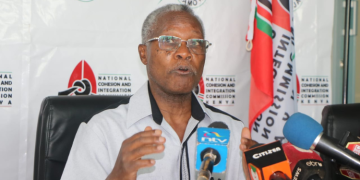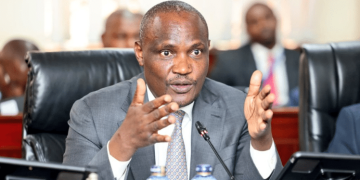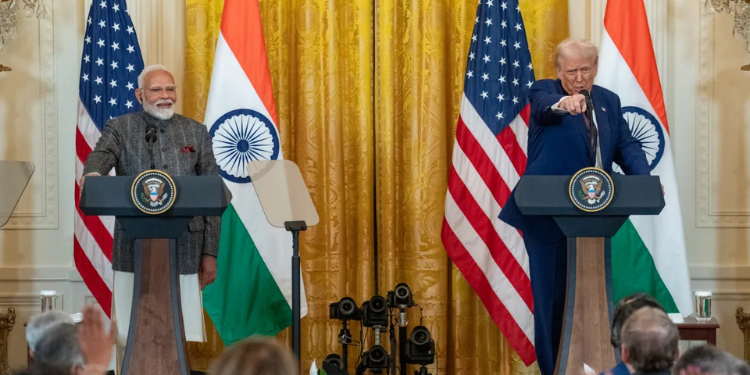President Donald Trump said he plans to “substantially” increase tariffs on India, as tensions between the US president and Indian Prime Minister Narendra Modi continue to escalate.
“We settled on 25% but I think I’m going to raise that very substantially over the next 24 hours, because they’re buying Russian oil,” Trump said in an interview with CNBC on Tuesday, August 5.
“They’re fueling the war machine. And if they’re going to do that, then I’m not going to be happy.”
India became one of the largest buyers of Russian oil after Western countries slapped sanctions on Russia in 2022, following its invasion of Ukraine. Russian oil trades at a discount to global oil prices, making oil more affordable for those countries that are willing to ignore Western sanctions on Russia.
Trump initially announced a 27% tariff on imports from India in April, but paused implementation to allow trade negotiations. More recently, the US president announced a 25% tariff on India set to begin on August 1, but that has been delayed to August 7.
However, Trump and US legislators have threatened much higher tariffs on countries that continue to do business with Russia. In July, Trump mentioned a 100% “secondary tariff” on Russia’s trading partners. Meanwhile, legislators in Congress are working on a bill that would allow tariffs of up to 500% on Russia’s trading partners.
India defends business with Russia
On its part, the government of Prime Minister Modi has accused the US and European Union countries of hypocrisy in their demands, noting that Europe continues to buy certain goods from Russia despite the sanctions.
“India began importing from Russia because traditional supplies were diverted to Europe after the outbreak of the conflict. The United States at that time actively encouraged such imports by India for strengthening global energy markets stability,” India’s Ministry of External Affairs said in a statement on Monday.
Also Read: The U.S.-India Tariff Dispute: Complete Timeline of Events
The statement went on to say that the European Union did €67.5 billion in trade of goods with Russia, and €17.2 billion in services trade, in 2024.
“This is significantly more than India’s total trade with Russia that year or subsequently,” the ministry said.
“Europe-Russia trade includes not just energy, but also fertilizers, mining products, chemicals, iron and steel and machinery and transport equipment.”
The statement added that India would “take all necessary measures to safeguard its national interests and economic security.”
India has long followed a policy of non-alignment in the conflict between the US and Russia, going back all the way to the Cold War.
However, that policy now appears to be unacceptable to Trump, who promised during the 2024 election to end the Russia-Ukraine war in a matter of days. Six months into Trump’s second term in office, the Ukraine war appears to be no closer to a resolution, and Trump has become increasingly frustrated with and critical of Russian President Vladimir Putin.
Also Read: New Trump Tariffs: Early Modelling Shows Most Economies Lose – the US More Than Many
Trump moves to pressure Putin
Some analysts point out that if the US and EU succeed in preventing countries like India from buying oil from Russia, it could result in a spike in oil prices worldwide. As of 2024, Russia provided about 10% of the world’s daily supply of oil.
The US and its allies had so far accepted India’s purchases of Russian oil “because they knew that if India is not buying oil from Russia, then inflation will go up,” Amitabh Singh, associate professor at Jawaharlal Nehru University’s Centre for Russian and Central Asian Studies, told CNN.
However, Trump has hinted at plans to tighten sanctions on Russia as he continues to pressure President Putin to end the war.
“If energy goes down low enough, Putin’s going to stop killing people,” Trump said in the CNBC interview. “If you get energy down another $10 a barrel, he’s going to have no choice, because his economy stinks.”
Follow our WhatsApp Channel and X Account for real-time news updates.


















































![Senator Allan Chesang And Chanelle Kittony Wed In A Colourful Ceremony [Photos] Trans Nzoia Senator Allan Chesang With Channelle Kittony/Oscar Sudi]( https://thekenyatimescdn-ese7d3e7ghdnbfa9.z01.azurefd.net/prodimages/uploads/2025/11/Trans-Nzoia-Senator-Allan-Chesang-with-Channelle-KittonyOscar-Sudi-360x180.png)
























